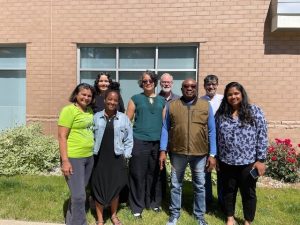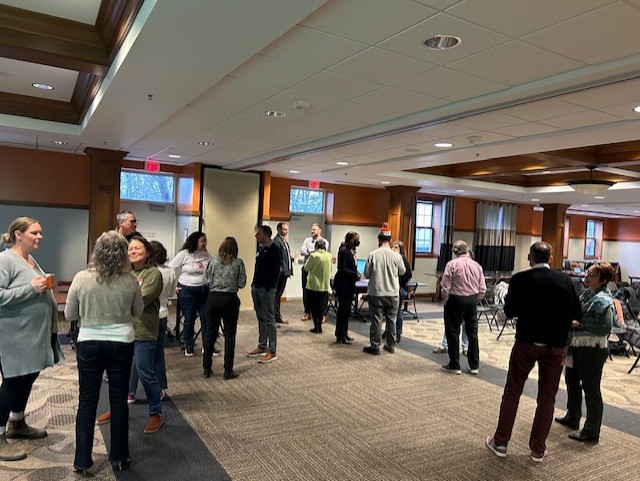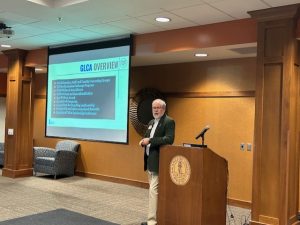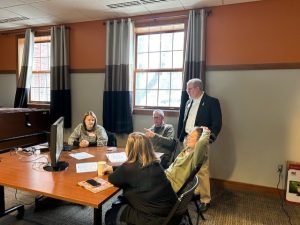TEACHING AND LEARNING
How to Restore Joy to the Classroom (Beckie Supiano, Chronicle of Higher Education, October 29, 2025): Sometimes, it means fixing what’s broken.
AI Has Joined the Faculty (Beth McMurtrie, Chronicle of Higher Education, November 4, 2025): More instructors are teaching with it. Is it making their courses better or dragging the profession down?
View: How Teacher Evaluations Broke the University (View) (Rose Horowitch, The Atlantic, September 12, 2025): “We give them all A’s, and they give us all fives.” (subscription required)
EXTRA CREDIT READING
The Edge: Faculty and administrators are on the same side (Guest essay by Ian F. McNeely, Scott Carlson, The Edge, Chronicle of Higher Education, October 30, 2025): Service obligations to the university should be seen as an authentic form of management, our guest columnist writes.
Anatomy of the Research Statement (opinion) (Letitia Henville, Inside Higher Ed, November 4, 2025): When it comes to promotion and tenure, don’t just describe your research—explain and quantify its impact.
The Enrollment Cliff Is Worse Than We Think (Beth Kania-Gosche, Inside Higher Ed, October 27, 2025): The challenge is far greater if we pay attention to college-readiness data.
Universities Can’t Pursue Truth Without Viewpoint Diversity (John Tomasi and Jonathan Haidt, Inside Higher Ed, October 29, 2025): This is what we wish critics of the concept on both the left and right would understand.
What’s Lost When Liberal Arts Schools Close (opinion) (Kevin Carey, New York Times, October 22, 2025)
AI Is the Future. Higher Ed Should Shape It. (Opinion) (Ted Underwood, Chronicle of Higher Education, November 4, 2025): To stay at the forefront of knowledge production, we must fit technology to our needs.
NYTimes: To Avert Crisis, Talladega College Sells Its Art Treasures (Arthur Lubow, New York Times, October 29, 2025): An H.B.C.U.’s remarkable Hale Woodruff murals commemorating Black history have been bought by an art museum and two foundations. But the college says it is not completely letting go.
Around the GLCA
DePauw University announces major gift: DePauw University Announces an $80 Million Gift to Build New Athletics Performance Center DePauw University proudly announces a landmark $80 million philanthropic commitment from an anonymous donor, an alumnus of the university. (see also: $50 Million To Stanford, $80 Million To DePauw University For Athletics (Forbes, Michael T. Nietzel, October 4, 2025)
American University in Bulgaria: Fulbright Science of Disinformation Symposium Call for Proposals. AUBG’s Center for Information, Democracy, and Citizenship is hosting an online symposium in February and is currently accepting proposals. More information here.
Editor: Colleen Monahan Smith ([email protected])
Did someone forward this email to you? Subscribe here
Have a short article or some news related to teaching and learning at your institution that you’d like to share with colleagues? Send your contribution along to us. Distributed by the GLCA/GLAA Consortium for Teaching and Learning
CTL Event
What brings you joy in your work? As a new academic year begins, how do you plan to maintain your work/life balance? What is one small thing you do each week to care for your well-being?
These questions are more important than ever as faculty face increasing demands and the risk of burnout. We invite you to join us for a practical and energizing online session: You Deserve Joy! Strategies to Avoid Burnout and Enhance Well-Being led by Alice Teall, Senior Director of Wellness at Kenyon College September 10th at Noon (EDT).
In this session, we will explore the cognitive and physiological roots of burnout and well-being, and learn evidence-based strategies to restore meaning, strengthen resilience, and enhance joy in your professional life. Practices such as gratitude, goal reflection, and connection-building will be shared as simple tools to support your personal and professional flourishing.
Dr. Alice Teall is the senior director of wellness at Kenyon, where she oversees the Health Services, Counseling Services and Health Promotion teams at the Cox Health and Counseling Center. Passionate about fostering a thriving campus community, Teall leads innovative wellness initiatives, supports services that empower students, and promotes strategies to enhance the well-being of students, faculty and staff.
Register HERE for this virtual event on Wednesday, September 10th at Noon (EDT). A link will be emailed one day prior. The session will be recorded.
We look forward to seeing you and beginning the year with a renewed commitment to joy and well-being.
TEACHING AND LEARNING
SUNY Expands Local News Collaborations for Student Learning (Ashley Mowreader, Inside Higher Ed, August 28, 2025): The Institute for Local News provides journalism students with work experience and supports civil engagement.
Math Is Out, Cake Is In: Introducing Students to Rubrics (Faculty Focus, August 27, 2025): Many students, particularly first-years, don’t understand the value of rubrics.
Students Hate Them. Universities Need Them. The Only Real Solution to the A.I. Cheating Crisis (Clay Shirky, New York Times, August 26, 2025): Learning is a change in long-term memory; that’s the biological correlate of what we do in the classroom. Now that most mental effort tied to writing is optional, we need new ways to require the work necessary for learning.
Half of College Students Say Their Mental Health is ‘Fair’ to ‘Terrible,’ Survey Finds (Higher Ed Dive, August 26, 2025): These issues may impact their trajectory, with large shares of learners reporting that they’re considering reducing their classload, transferring or dropping out.
An AI Tool Says It Can Predict Students’ Grades on Assignments. Instructors Are Skeptical (Aisha Baiocchi, Chronicle of Higher Education, August 26, 2025): The “AI Grader” from Grammarly bases its evaluations on rubrics and syllabi submitted by students, as well as “publicly available instructor information.”
Young People See Math Skills as Nonessential. How Can Higher Ed Help? (Ashley Mowreader, Inside Higher Ed, August 25, 2025): Thirty-eight percent of young adults think math is very important in their work life; fewer believe it’s important in their personal life.
On the AHA AI Guidelines (John Warner, Inside Higher Ed, August 22, 2025): A great document to start a conversation, but off the mark for the conversation we need to be having.
Here’s What Happened When I Made My College Students Put Away Their Phones (Ezekiel J. Emanuel, New York Times, August 21, 2025): With nothing else changed, course reviews went up dramatically.
How Do You Manage Class Time When Students Are Unprepared? (Beth McMurtrie, Chronicle of Higher Education, August 21, 2025): Is the only option to require less work out of class? McMurtrie asks some faculty.
A Different Way to Think About AI and Assessment (Bonni Stachowiak, Teaching in Higher Ed, August 21, 2025): A 44-minute podcast with Danny Liu.
FIRST DAY OF CLASS
Paul Hanstedt (Faculty Focus, August 23, 2024): On the First Day of Classes, Begin with Intrigue.
Cornell University’s Center for Teaching Innovation offers a variety of suggestions for “The First Day of Class.” You’ll find them here. And Tony’s Teaching Tips offers two more: Improving Your Next Syllabus (Dec 2024) and Zhuzhing Up Your Syllabus (Aug 2024)
HIGHER ED IN TODAY’S WORLD
Trump Administration Plans to Limit How Long Foreign Students Can Study in the US (Rebecca Carballo, Politico, August 27, 2025): Foreign students have been allowed to stay in the country for as long as they were full-time students making progress in their degrees.
Grant Delays Threaten Cultural and Language Studies Programs (Johanna Alonso, Inside Higher Ed, August 25, 2025): Expected funding for National Resource Centers, which are dedicated to language and area studies education, never came through this summer. Experts worry this could spell disaster for the already-struggling fields.
Harvard Is Making Changes Trump Officials Want, Even Without a Deal (Stephanie Saul, New York Times, August 23, 2025): In some cases, students and faculty members worry, the new, Trump-inspired policies may interfere with the freedom of expression that is central to the university’s mission.
Haverford College Faces Education Department Investigation into Antisemitism (Laura Spitalniak, Higher Ed Dive, August 21, 2025): The probe into the Pennsylvania liberal arts college is only the latest in a string from the Trump administration as it seeks to crack down on higher education.
EXTRA CREDIT READING
How to Get Through the Year, and Maybe Even Thrive (Sarah Rose Cavanagh, Chronicle of Higher Education, August 27, 2025): Four ways to nurture academic well-being in these uniquely challenging times.
The Book That Explained the University to Itself (Scott Spillman, Chronicle of Higher Education, August 25, 2025): Laurence Veysey’s 1965 tome remains the most incisive portrait of higher education.
The Typical College Student Is Not Who You Think (Alan Blinder and Steven Rich, New York Times, August 25, 2025): As a fight over the future of elite higher education consumes university leaders and politicians, most college students live in a very different world with very different challenges.
Divided We Fall (Adrianna Kezar and Susan Elrod, Inside Higher Ed, August 26, 2025): To effectively confront external threats to higher ed, campus leaders will need to address an internal one: the faculty-administration divide
What 30 Years of Campus Racial Climate Research Can Teach Higher Ed (Sara Weissman, Inside Higher Ed, August 25, 2025): Three decades of research on campus climate for students of color shows that little about their experience has changed. The authors of a recent paper hope further research can help.
How to Save the American University (Jacob Hale Russell and Dennis Patterson, Guardian, August 24, 2025): As Trump threatens funding and public trust plummets, US schools are in the fight of a lifetime. This is how they can survive – with their souls intact.
Education Department Quietly Removes Rules for Teaching English Learners (Laura Meckler and Justine McDaniel, Washington Post, August 20, 2025: The move is an acceleration of President Donald Trump’s executive order declaring English the country’s “official language.”.
Student Arrivals to US Continue to Plummet, with Asia Hit Especially Hard (K. Oanh Ha, Bloomberg, August 19, 2025): Total arrivals on student visas decreased 28%, the biggest monthly drop so far this year.
EVENTS AROUND THE GLCA – ALL ARE WELCOME!
“Contemporary Attacks on Academic Freedom: Historical and Comparative Perspectives,” a talk by Eve Darian-Smith, Global and International Studies professor from UC Irvine, sponsored by the College of Wooster, September 3, 7:30 PM (Eastern) in person (Gault Recital Hall) or live-stream. This is the first in a series of three events as part of Wooster’s Democracy and Academic Freedom Forum.
Editor: Steven Volk ([email protected])
Did someone forward this email to you? Subscribe here
Have a short article or some news related to teaching and learning at your institution that you’d like to share with colleagues? Send your contribution along to us.
GLCA/GLAA Consortium for Teaching and Learning
Co-Directors:
Lew Ludwig ([email protected])
Colleen Monahan Smith ([email protected])
The Great Lakes Colleges Association (GLCA) has been awarded a $1.5 million grant from the Mellon Foundation to establish the GLCA Academic Leadership Fellows Program, an initiative designed to build academic leadership capacity among humanities faculty and expand the breadth of perspectives contributing to institutional decision-making at GLCA institutions.
Through this two-year fellowship, ten humanities faculty from GLCA institutions will engage in immersive leadership experiences tailored to institutional priorities. Fellows will benefit from mentoring, cohort-building, and professional development grounded in self-reflection and strategic self-awareness.
“This program will cultivate the next generation of academic leaders whose humanistic perspectives are essential to ethical, mission-driven leadership in higher education,” said GLCA President Mickey McDonald.
Institutions will nominate promising faculty, and the GLCA will select a cohort representing a range of backgrounds and experiences. The program will begin with a retreat in Spring 2026 with Fellows serving in their campus leadership roles through the 2026-27 and 2027-28 academic years. Summer leadership development workshops will be held in 2026 and 2027 with a closing retreat held in 2028.
The Great Lakes Colleges Association is pleased to announce the winners of the 2024 GLCA New Writers Award for Poetry, Fiction, and Creative Non-fiction. Since 1970, the New Writers Award confers recognition on promising writers who have published a first volume in one of the three genres. Judges of the New Writers Award are faculty members of creative writing and literature at GLCA’s member colleges. Winning writers receive invitations to visit GLCA member colleges, where they give readings, meet with students and faculty members, and discuss technique and creativity in the writing process.
The 2024 winner for Poetry is Jesse Nathan, Eggtooth, published by Unbound Edition Press. Our GLCA judges note:
With lush sounds and an opulence of rhymes and off-rhymes, Jesse Nathan’s language evokes the intensity and insistence of memory. The poems are born of an attention to the poet’s native Kansan landscape; they bristle with flora and fieldwork. We learned new words (“sneezeweeds,” what fun!) and new dangers (fire in the farmhouse crawlspace). Language is itself an occasion for many of the poems in Eggtooth and the work almost resists the reader’s ability to keep up, since his poems induce a strong temptation to stop, re-read, wonder over the latticework of each stanza, each carefully lathed line, each rhyme, and even each word: “caruncle,” “catenary,” “hackberry.” His bold yet disciplined experiment with form in this book is deeply motivated, giving these exquisitely made poems a compelling urgency and depth. As the poems’ speaker emerges into adulthood, changed by experience, the language and lines shape-shift, yet never forget where they began. We found joy in these poems.
Judges of the Poetry Award were:
Christopher Bakken, Allegheny College
Derek Mong, Wabash College
Lynn Powell, Oberlin College
The 2024 winner for Fiction is D.K. Nnuro’s What Napoleon Could Not Do, published by Riverhead Books. Our GLCA judges note:
This work had us immersed from start to finish, truly a delight to read. Bold in its scope, Nnuro’s debut novel wrestles with the complexity of the American Dream and the fleeting nature of what it means to succeed. This epic takes readers across oceans and decades in its quest for a sense of home and belonging as it weaves contrasting experiences of America. A tale about the personal, socio-economic and identity struggles of two Ghanian siblings — one brother, who has no luck, can’t get out of Ghana, and this comes to represent his failures. The sister, imbued with luck, gets to America, but is unable to get a Green Card. It is a searing and honest indictment of the American Dream. Here we see Nnuro wield various point-of-view characters as he brings a rich assortment of subjects to the table — from early friendships and coming-of-age cares to PTSD as regarding a minority American veteran, to the age-old multifaceted frictions to be found in relationships between Africans and African Americans. Unlike most traditional novels about emigration, this becomes a novel of return and paints a vivid picture of what it means to leave one’s country and what it could mean to return, especially when the American Dream is given up.
Judges of the Fiction Award were:
Michael Brooks, Hope College
Onyinye Ihezukwu, Earlham College
Ivelisse Rodriguez, DePauw University
The 2024 winner for Creative Non-Fiction is Roger Reeves, Dark Days: Fugitive Essays, published by Graywolf Press. Our GLCA judges note:
Dark Days, poet Roger Reeves’ first collection of nonfiction, is a lyrical, erudite, and impassioned collection of essays that probe the intersection of aesthetics and ongoing racist history. Reeves looks to poetry, music, film, and digital media for both precedents of, and resistances to, the inescapable violence of our pandemic era. He dares us to imagine modes of Black sociality beyond suffering. If we think differently, he suggests, if we are attentive and make space for silence and unknowing, perhaps we could discover new forms of Black ecstasy and self-knowledge, even when everything about our current moment mitigates against it. His urgent and supple essays challenge and provoke. In asking, “What is the necessity of singing during catastrophe?” he brings together T. S. Eliot and Pharoah Sanders, Zora Neale Hurston and OutKast, Michael Williams and the Pentecostal church of his own upbringing, Toni Morrison and the 1619 Project, and his experiences as a poet and teacher. Indeed, one of this inventive collection’s hallmarks is its rigor, its constantly asking us to read more flexibly and fugitively, to embrace joy and beauty and love, to understand that “[t]o survive requires a lyric, ironic, improvisational sensibility” and to recognize that sensibility’s manifold presences in Black life and culture and its necessity for any kind of livable American future. These essays offer a meditation on race through a juxtaposition of powerful literary, political, artistic, linguistic images that speaks to the cacophony of this cultural moment. Driven by a desire for freedom, community, and ecstasy, it brilliantly theorizes through the personal as well as the historical and cultural, showing how inextricable they are, and comes out the other side with the deep wisdom earned through listening and silence.
Judges of the Creative Non-Fiction Award were:
Sarah Heidt, Kenyon College
Marin Heinritz, Kalamazoo College
Michael Weinstein, Earlham College
For more information on the New Writers Award, please contact Colleen Monahan Smith ([email protected]) at the GLCA. Additional information is available on the GLCA web site: GLCA New Writers Award


 Council ended the 2023-2024 year with an in-person convening of seven members from five campuses along with GLCA President Mickey McDonald. They wrapped up conversations about this year’s topic – Recruiting and Retaining BIPOC Faculty – and also talked more generally about leadership on campus.
Council ended the 2023-2024 year with an in-person convening of seven members from five campuses along with GLCA President Mickey McDonald. They wrapped up conversations about this year’s topic – Recruiting and Retaining BIPOC Faculty – and also talked more generally about leadership on campus.

